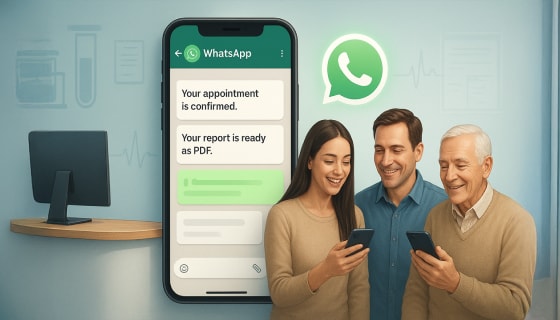How do you convince someone to leave a review? It’s a question that often leaves healthcare providers scratching their heads. Asking for reviews can feel awkward, especially when you’re in the business of care, not sales. But here’s the thing—reviews are digital referrals, and just like a glowing recommendation from a friend, they hold serious power in building trust with potential patients. After all, online reviews are one of the most influential factors in helping patients decide on a healthcare provider. That means your next patient could choose you simply because they read a positive review from someone they trust.
The problem is, nobody wants to feel like they’re begging for stars or putting patients in an uncomfortable position. So, how do you ask without sounding like a pushy salesperson or a broken record? That’s where the art of asking comes in. You want to make the process feel as natural as a friendly chat, unlike a sales pitch. In this blog, we’ll show you how to gather 50+ reviews effortlessly—without the stress, discomfort, or awkward moments. Let’s dive into how you can make social proof work for you, without losing the human touch that makes your practice special.
Why Quantity AND Quality of Reviews Matter
It’s not just about the stars—it’s about the right stars. A steady stream of fresh, glowing reviews packed with the right keywords can skyrocket your visibility and credibility faster than you can say “five stars”. Here’s why star ratings, recency, and keyword content are the magic trio for boosting your clinic’s trust and visibility:
Star Rating
Stars aren’t just for ratings—they’re your clinic’s street cred. A solid 4.5+ stars make you look like a rockstar in the eyes of potential patients. But it’s not just about the number—consistency is key. Keep those glowing reviews rolling in and watch your practice shine brighter than the competition.
Recency
Old reviews? So last year. To stay competitive, ensure your reviews are up-to-date. The more recent the feedback, the more trustworthy it feels to new patients. It’s like showing them you’re still actively providing top-notch care, not just resting on your past achievements.
Keyword Content
If your reviews could talk, they’d want to drop some serious keywords. When patients mention specifics like “family care,” “pediatric care,” or “emergency services,” Google listens. Reviews with relevant keywords help your profile appear when people search for exactly what you offer. So, don’t be shy—encourage patients to highlight the services they love.
When to Ask for a Review
Asking for patient reviews at the right moment can make all the difference. It’s about timing the request when the patient feels positive about their experience and is willing to share their feedback. Below are the best times to ask your patients for reviews:
- Post-Treatment or Post-Consultation (In-Clinic)
Ask for a review when the patient is still in your clinic and satisfied with their treatment.
Example: “We are glad to hear that your treatment went well today.Please take a moment to leave a review and share your experience. - During a Follow-Up Appointment
If the patient is returning for a follow-up, it’s an excellent opportunity to request a review based on their ongoing positive experience.Example: It’s great to see you making progress. If you are satisfied with the care you received, please take a moment to share your review.
- After Discharge or Treatment Completion (via SMS or Email)
Send a follow-up message thanking the patient for their trust, along with a direct link to leave a review.Example: Thank you for choosing us for your care. If you feel comfortable, we’d greatly appreciate it if you could leave a brief review about your experience.
- After Positive Feedback or Compliment
If a patient compliments your services during the visit, ask them to share that sentiment in a review.Example: We appreciate your kind words. If you’re willing, a quick review sharing your experience would mean a great deal.
- During a Patient Check-In Call
If you’re checking in with a patient after their treatment, this is a good time to ask for feedback.Example: I’m glad to hear that everything is going well with your recovery. If you’re satisfied with our services, would you mind leaving a review?
- After a Virtual or Telehealth Session
Post-session is a perfect time to follow up and request feedback on the virtual experience.Example: Thank you for attending the virtual consultation today. If you found it helpful, we’d appreciate a quick review.
How to Request Patient Reviews: Compassionate Scripts for SMS, WhatsApp, & Email
As healthcare professionals, it’s essential to build lasting, trust-based relationships with patients. One way to maintain that connection is by asking your patients for reviews. Not only do patient reviews help improve your online presence, but they are also critical for medical practices looking to attract more patients. However, it’s essential to approach this request in a thoughtful and non-pushy way.
Here are scripts for SMS, WhatsApp, and email designed to gently encourage patients to leave feedback without making them feel pressured. These scripts use a caregiver/sage tone that reflects your commitment to compassionate care.
SMS Script: Simple, Direct, and Compassionate
Let’s understand how to ask for feedback in a gentle, straightforward way through an SMS. Here’s an example of a script you can use to request a review without being pushy:
Subject: A Quick Request for Your Feedback
Message:
We hope your treatment went well, and you’re feeling better. If you’re satisfied with your care, we’d be truly grateful if you could leave a review. Positive reviews like yours help others find the care they need. Thank you for being part of our community!
WhatsApp Script: Friendly and Personal
Let’s take a look at how to ask for feedback in a more personal and friendly manner through WhatsApp. Below is an example script you can use:
Message:
Hi [Patient’s Name], I hope you’re doing well! It was a pleasure working with you. Patients’ reviews play a key role in our growth and continued ability to help others. If you’re happy with your experience, we’d appreciate it if you could share a quick review. Here’s the link to submit: [link].
Email Script: Thoughtful and Patient-Centered
Let’s explore how to request patient feedback via email in a way that feels personal yet professional. Here’s an example script you can use:
Subject: We’d Love to Hear About Your Experience
Message:
We hope your experience with us was positive and that you’re feeling better. If you’re happy with the care you received, we’d be truly grateful if you could take a moment to leave a review. Patient reviews are critical for medical practices, as they help others find the care they need. Your feedback also helps us improve and continue providing the best care possible. Thank you for being a valued part of our practice!
Follow-Up Email Script: Gentle Reminder for Feedback
Let’s understand how to follow up with a gentle, thoughtful reminder for a review. Here’s an example of how to ask for feedback in a follow-up email:
Subject: A Quick Reminder—We Value Your Feedback
Message:
We hope you’re doing well! Just a friendly reminder about our recent visit and how much your feedback means to us. Asking for reviews is a way to ensure we’re constantly improving. If you’re satisfied with your care, would you mind taking a moment to leave a quick review? Positive reviews help others in need of the proper care and guide them to choose our practice. Thank you for your time and support!
Streamline Your Feedback: Top Tools to Automate Patient Review Requests
Automating the process of requesting reviews can save time while maintaining a consistent and personalized approach to asking for feedback. Here are some tools you can use to automate review requests:
Birdeye
Birdeye is a comprehensive platform designed to help businesses manage and automate their online reputation. It integrates with various review sites and automates review requests through email, SMS, and other communication channels.
Key Features:
- Automated Review Requests: Send automated requests to patients via text, email, or direct links.
- Customizable Workflows: Create workflows for patient feedback and review collection, ensuring a seamless process.
- Review Monitoring: Keep track of reviews from multiple platforms in one dashboard.
- Reporting & Analytics: Measure the effectiveness of review requests and patient satisfaction.
How It Helps:
Birdeye allows you to automate review requests and monitor patient feedback all in one place, helping to streamline the process of asking for reviews without being pushy.
WhatsApp Business
WhatsApp Business is a powerful tool for direct communication with patients and customers. With its automation features, you can easily set up auto-replies and message templates, including review requests, to engage your patients.
Key Features:
- Automated Replies: Set up automated responses for initial inquiries and review requests.
- Message Templates: Create customized templates that patients can easily respond to, including review requests.
- Personalized Communication: Use patient data to send targeted review requests, making the process feel more personal.
- Broadcast Lists: Send review request messages to multiple patients at once, saving time.
How It Helps:
With WhatsApp Business, you can send automated review requests that feel more personal, directly reaching your patients where they are most active.
Mailchimp
Mailchimp is primarily an email marketing tool, but it can be highly effective for automating review requests. You can set up automated email campaigns to send personalized review requests after a patient’s visit or treatment.
Key Features:
- Automated Email Campaigns: Set up email sequences that automatically send review requests after specific triggers, like a completed visit or treatment.
- Personalization: Personalize emails with patient names, treatment details, and direct review links for a more tailored experience.
- Templates & A/B Testing: Use ready-made templates for review requests or test different versions to see which gets the best response.
- Analytics: Track the success of review request emails and optimize future campaigns.
How It Helps
With Mailchimp, you can create automated email campaigns that regularly remind patients to leave feedback, all while tracking open rates and engagement for optimization.
Why Automate Review Requests?
- Saves Time: Set it up once, and it runs on autopilot, saving your team hours.
- Consistency: Ensure every patient receives a request at the optimal time.
- Increased Engagement: Personalized, timely requests lead to higher response rates.
- Monitor Progress: Keep track of your review performance across platforms.
How to Handle Negative Reviews Professionally
Negative reviews can feel challenging, but how you respond to them can make a significant difference in maintaining your practice’s reputation. Handling negative feedback professionally not only shows your commitment to improvement but also strengthens trust with existing and potential patients. Here’s how to approach negative reviews with professionalism and grace:
Acknowledge and Validate the Patient’s Experience
When responding to negative feedback, it’s essential to show empathy and acknowledge the patient’s experience. Validating their feelings helps to de-escalate the situation and shows that you care about their concerns.
Example Response:
Thank you for sharing your feedback. We’re sorry to hear about your experience and truly value your input. We understand how frustrating this situation must have been for you.
Stay Calm and Professional
It can be tempting to become defensive or emotional when responding to criticism, but it’s essential to remain calm and professional. Your response represents your practice, so it’s essential to keep the tone polite, respectful, and constructive.
Example Response:
We take all feedback seriously, and we’re grateful for the opportunity to learn from your experience. We’d love to make things right and improve moving forward.
Offer a Solution or an Invitation to Discuss Further
If appropriate, offer a solution to the problem or invite the patient to continue the conversation privately. This shows that you’re proactive about resolving issues and that you value the relationship with your patients.
Example Response:
We’d like to resolve this matter and ensure your satisfaction. Please contact us at [phone number/email] so we can address your concerns in more detail.
Apologize, Even If You Disagree
Even if you feel the review is unfair or inaccurate, offering an apology for the patient’s dissatisfaction goes a long way. A simple apology for any inconvenience caused can demonstrate your commitment to patient care.
Example Response:
We apologize for any frustration this may have caused. Our goal is always to provide the best care, and we’ll work to ensure this doesn’t happen again.
Take the Conversation Offline
If the issue is more complicated or involves personal matters, it’s best to take the conversation offline. This allows you to address the situation without the risk of further public escalation and shows the patient you’re dedicated to resolving the issue privately.
Example Response:
We’d love to speak with you directly to understand your concerns better. Please feel free to contact us at [contact info], and we’ll be happy to assist you.
Learn from the Feedback and Make Improvements
After addressing the review, take a step back and evaluate the feedback. If there’s any merit to the complaint, make the necessary adjustments in your processes or communication to avoid similar issues in the future. Demonstrating that you learn from criticism can improve your service and build stronger patient loyalty.
Why Responding Professionally Matters
- Builds Trust: A professional response demonstrates to prospective patients that you are committed to resolving issues and delivering excellent care.
- Shows Accountability: Taking responsibility for any shortcomings and working to fix them demonstrates your dedication to improvement.
- Increases Credibility: When you handle negative reviews effectively, it enhances your credibility and can even convert a dissatisfied patient into a loyal one.
- Improves Patient Retention: Addressing issues positively and proactively can help prevent patients from leaving your practice and encourage long-term relationships.
Review Strategy Do’s & Don’ts for Healthcare Clinics
Patient reviews are invaluable for building trust and credibility in healthcare clinics. However, collecting and managing reviews requires a strategic approach to ensure you’re enhancing your online reputation while staying compliant with industry regulations. Below is a guide outlining the dos and don’ts for managing reviews effectively in healthcare.
Respond Promptly and Professionally
Responding to both positive and negative reviews quickly shows that you care about patient feedback. A prompt response demonstrates that you value your patients’ time and concerns.
Example Response: Thank you for sharing your feedback. We’re sorry to hear about your experience and truly value your input. We understand how frustrating this situation must have been for you.
Encourage Honest Feedback
Encouraging patients to leave honest reviews helps build credibility. Transparency fosters trust among new patients and shows your clinic’s commitment to continuous improvement.
Example Response: We truly value your feedback and would love to hear about your experience with us. Your honest review helps us continue to provide the best care possible. If you’re comfortable, we’d appreciate it if you could take a moment to share your thoughts. Your input is essential in helping us improve and better serve you.
Personalize Your Responses
Tailoring your responses to specific patient experiences rather than using generic replies helps build a personal connection and demonstrates genuine care.
Example Response: Thank you, [Patient’s Name], for your kind words about our team. We’re thrilled to hear that you felt well taken care of during your visit. We also appreciate your constructive feedback regarding the wait time. We’re currently reviewing our appointment scheduling to ensure quicker service in the future. If you’d like to discuss your experience in more detail, please feel free to contact us directly at [phone/email]. We’re committed to continuous improvement and would love to make your next visit even better.
Monitor Your Reviews Regularly
Consistently monitoring patient reviews ensures that you can address any negative feedback promptly and highlight positive experiences to foster trust.
How to Do It:
- Set up alerts to track new reviews across various platforms, including Google, Facebook, and Healthgrades.
- Use reputation management tools to streamline the process of monitoring and responding to reviews.
Use Positive Reviews to Your Advantage
Positive reviews can be powerful marketing tools. Use them to highlight your clinic’s strengths and build a sense of credibility and trust among new patients.
How to Do It:
- Display positive reviews prominently on your website and social media.
- Use testimonials in marketing materials and patient referral programs.
Conclusion
Building a strong reputation through patient reviews is crucial for any healthcare practice. By using thoughtful strategies and choosing the right moments to ask for feedback, clinics can gather valuable reviews without feeling like they are pushing their patients. It’s about making the process as seamless and natural as possible—helping both the clinic grow and patients feel heard.
While positive reviews can enhance visibility, addressing negative feedback with professionalism also strengthens credibility and trustworthiness. By adopting the right tools to automate the process and ensuring that every review is handled with care, the quality and quantity of reviews will grow steadily.
For clinics looking to streamline review management, partnering with experts like ZealousWeb can make all the difference. Their tailored solutions help practices manage patient reviews effectively, ultimately enhancing online presence and reputation.














